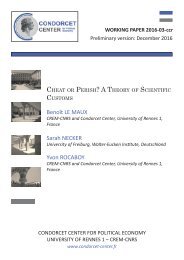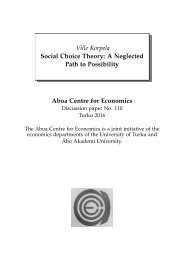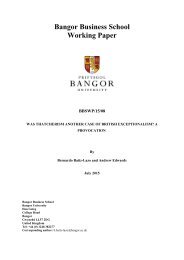MEMORANDUM
n?u=RePEc:hhs:osloec:2016_018&r=hpe
n?u=RePEc:hhs:osloec:2016_018&r=hpe
You also want an ePaper? Increase the reach of your titles
YUMPU automatically turns print PDFs into web optimized ePapers that Google loves.
The basis for the Eisenaufsatz was thus the Versuch paradigm, it had not been<br />
abandoned, only modified to provide a somewhat better theoretical approach. In the very<br />
first sentence of Eisenaufsatz Leontief cited the Versuch treatise and its Simultan-Methode<br />
for statistical analysis of supply and demand curves and stated in a footnote his intention of<br />
dealing with the criticism raised against it in an “anti-critical essay” (Leontief 1932, p.66,<br />
fn.1).<br />
Farewell to Europe<br />
At the end of July 1931, Leontief received the galley proofs and wrote to Schumpeter<br />
to say that he would send him the pages which covered the theoretical core of the treatise.<br />
It was only one month left until Leontief’s scheduled departure for New York on 29<br />
August. He regretted deeply that it had been beyond reach to have a chance to speak with<br />
Schumpeter before the departure. He still hoped that Schumpeter would have an<br />
opportunity to glance through the extract he had made while it was still possible to make<br />
last minute changes. The treatise was above all about changes in economic equilibrium<br />
such as they had discussed in Bonn. To finish up the manuscript of the Eisenaufsatz had<br />
been strenuous and time consuming and the only piece of work he had got done in addition<br />
to a review of Marschak’s book based on his habilitation thesis (Leontief 1931).<br />
Marschak’s paper for the forthcoming first Econometric Society meeting at the end of<br />
September was based on the book, it was a meeting Leontief would have loved to attend<br />
but he was committed to be at work in NBER at that time. 160<br />
At their meeting in Bonn Schumpeter had elaborated on his own work and plans as it<br />
is well known that he did in the circle of younger economists around him at Harvard. In his<br />
letter to Schumpeter at the end of July 1931 Leontief expressed delight and excitement that<br />
Schumpeter’s book on monetary issues (Geldbuch) would soon be finished. He also<br />
expressed the hope that Schumpeter would soon issue his 1908 book Das Wesen under der<br />
Hauptinhalt … in a new edition, “Es ist so dringend notwendig”. As students of<br />
Schumpeter know, the Geld-Buch was never finished and Das Wesen never re-issued.<br />
In Schumpeter’s last letter before Leontief’s departure was no longer so hopeful about<br />
the Geldbuch, as he had felt nervous and unwell. But in the winter he would devote<br />
himself to the new edition of Das Wesen, or rather the new book that would come out of<br />
that process, adding, “A pity we cannot cooperate on that”. 161 Schumpeter regretted that he<br />
wouldn’t see Leontief again before his departure but hoped he would hear from in on a<br />
curve!) would be discarded as insufficiently precise. This was a reference to the sharp criticism of<br />
Schultz (1930), which was concerned with Leontief’s results for the sugar market.<br />
160 Leontief to Schumpeter, 28 July 1931.<br />
161 Schumpeter to Leontief, 5 August 1931, transl. by ob.<br />
68





